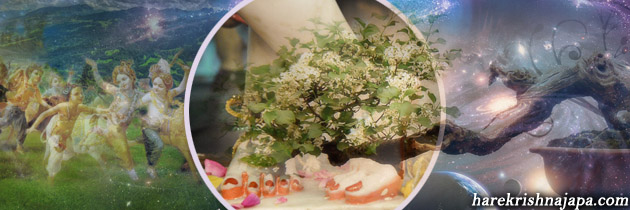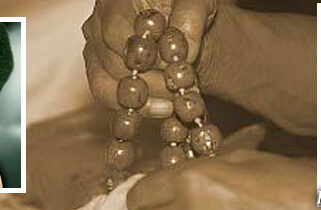14 Chanting of the holy name continues in the liberated state
Even a self realized devotee must continue to execute all scriptural injunctions, especially hearing and chanting:
[Lord Caitanya to Sanatana Gosvami]: “There are two processes by which one may execute this raganuga bhakti−external and internal. When self realized, the advanced devotee externally remains like a neophyte and executes all the sastric injunctions, especially hearing and chanting. However, within his mind, in his original purified self realized position, he serves Krsna in Vrndavana in his particular way. He serves Krsna twenty−four hours, all day and night.”
– Sri Caitanya caritamrta Madhya lila 22.156−57
An uttama−adhikari chants the prescribed number of rounds on japa beads:
When a neophyte devotee is actually initiated and engaged in devotional service by the orders of the spiritual master, he should be accepted immediately as a bona fide Vaisnava, and obeisances should be offered unto him. Out of many such Vaisnavas, one may be found to be very seriously engaged in the service of the Lord and strictly following all the regulative principles, chanting the prescribed number of rounds on japa beads and always thinking of how to expand the Krsna consciousness movement. Such a Vaisnava should be accepted as an uttama−adhikari, a highly advanced devotee, and his association should always be sought.
– The Nectar of Instruction Text 5
Chanting a fixed number of rounds on beads is necessary for everyone, even a paramahamsa:
Madhavendra Puri left the temple and sat down in the village marketplace, which was vacant. Sitting there, he began to chant. In the meantime, the temple priest laid the Deity down to rest.
Although Madhavendra Puri was not interested in eating and sleeping, his interest in chanting the maha mantra was as acute as if he were an aspiring transcendentalist rather than a paramahamsa. This means that even in the paramahamsa stage, one cannot give up chanting. Haridasa thakura and the Gosvamis were all engaged in chanting a fixed number of rounds; therefore chanting on beads is very important for everyone, even though one may become a paramahamsa. This chanting can be executed anywhere, either inside or outside the temple. Madhavendra Puri even sat down in a vacant marketplace to perform his chanting. As stated by Srinivasa Acarya in his prayers to the Gosvamis: nama−gana−natibhih. A paramahamsa devotee is always engaged in chanting and rendering loving service to the Lord.
– Sri Caitanya caritamrta Madhya lila 4.125
The process of chanting continues even after the bhakti yoga creeper reaches the lotus feet of Krsna in Goloka Vrndavana:
The primary practice of bhakti yoga will cause the seed already sowed in the heart to sprout, and by a regular watering process, as mentioned above, the bhakti yoga creeper will begin to grow. By systematic nurturing, the creeper will grow to such an extent that it will penetrate the coverings of the universe, as we have heard in the previous verses, reach the effulgent sky, the brahmajyoti, and go farther and farther and reach the spiritual sky, where there are innumerable spiritual planets called Vaikunthalokas. Above all of them is Krsnaloka, or Goloka Vrndavana, wherein the growing creeper enters and takes repose at the lotus feet of Lord Sri Krsna, the original Personality of Godhead. When one reaches the lotus feet of Krsna at Goloka Vrndavana, the watering process of hearing and reading, as also chanting of the holy name in the pure devotional stage, fructifies, and the fruits grown there in the form of love of God are tangibly tasted by the devotee, even though he is here in this material world.
– Srimad Bhagavatam 2.2.30
In Vaikuntha, the liberated souls are always chanting:
In Vaikuntha, the spiritual world, there is no anxiety. Vaikuntha means “freedom from anxiety,” and in Vaikuntha the liberated souls are always dancing, chanting, and taking prasada. There are no factories, hard work, or technical institutions. There is no need for these artificial things. In Vedanta−sutra it is stated, anandamayo ‘bhyasat: God is anandamaya, full of bliss and pleasure. Since we are part and parcel of God, we also possess these same qualities. So the goal of our yoga process is to join with the supreme anandamaya, Sri Krsna, to join His dance party. Then we will be actually happy.
– The Path of Perfection






